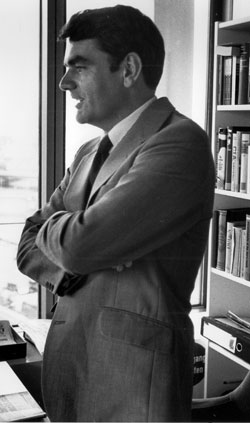Photo follows General
Werner Lange invited Mr Irving also to speak to his
Panzer Division officers in Württemberg.
Germany's Socialist government did not take kindly
to this.
Transcription
of Handwritten letter from David Irving to his wife
describing recent lectures he had given in
Germany's Rhineland Koblenz [Germany], 26th
April 1979 THE present tour is about a week old
[...] The meetings here are extraordinarily
interesting and exciting, although you did not seem
particularly interested when I began telling you of
last night's audiences on the phone this morning.
What a pity that you never learned German! The
excitement started with Monday evening, when I
arrived at 8:00 pm at Bonn University and found
seven or eight hundred students and academics
packed into a hall, waiting for me (and the
organizers very nervous, because they did not know
until the last moment that I had arrived.) There
were a lot of critics in the audience, but I
silenced them all: there was loud applause,
laughter and cheering -- a fantastic meeting.  Afterwards
a university official handed me a letter, from a
poor woman in a village outside Bonn, describing
how desperately her son had wanted to be there to
hear me; a politics student, he had red-lettered
the day in his diary weeks in advance, and noted
that he was going to come and hear me -- but that
he had been very badly injured in Marseilles and
could I send him an autograph? Afterwards
a university official handed me a letter, from a
poor woman in a village outside Bonn, describing
how desperately her son had wanted to be there to
hear me; a politics student, he had red-lettered
the day in his diary weeks in advance, and noted
that he was going to come and hear me -- but that
he had been very badly injured in Marseilles and
could I send him an autograph?
It is all rather worrying and disturbing, this
growing hysteria: If I am fortunate I shall be able
to guide [it] into useful channels,
channels other than just that of getting the new
book into the Best Sellers list. I wrote a two-page
letter describing the [Bonn University]
meeting in every detail for the boy, and I have
promised that if I pass near Marseilles at the end
of June I will visit him if he is still in
hospital. Last night's meeting -- the one you did not want
to hear about -- was smaller but even more
extraordinary. Two hundred officers of the German
army, navy and air force were assembled in the
Military School of Inner Leadership. Half of them
were in uniform -- three-star generals, colonels,
admirals, and captains. Much to their added
nervousness, this was the day that the deputy
Supreme Commander (Inspector-General) of the
forces, General Heinz, had chosen to make an
unannounced inspection visit! So in front of me I
had also the second highest-ranking officer in
Germany. I spoke, as invited, for forty minutes on
Hitler and my research and writing methods,
and I particularly criticized the methods and
results of the academic historians. Once, when I referred critically to the
anti-Hitler resistance, there was an audible
excited murmur from the audience, and several
officers sneaked glances at the front row to see
how General Heinz was reacting to this provocation.
He sat sphinx-like and smiling. Once, when Professor [Hans]
Adolf Jacobsen, one of their most famous
historians, in his reply to my lecture, suggested
that my Hitler book told him nothing new, General
Heinz turned to a neighbour, as he told me later,
shook his head and said: "I disagree. A lot of the
things that Irving has revealed were completely new
to me...!" Afterwards we sat in the officers' mess talking
until midnight, then General [Werner]
Lange invited us back to his house for drinks.
(Orange juice in my case) and it was after 2:00 am
before I got to bed. Today he invited us to lunch
-- a very fine steak. He was in a good humour as
the deputy Inspector-General [Heinz] had
congratulated him on the evening. He is going to be
posted to Hamburg and promoted. He says he wants me
to return in the autumn. I find it very interesting
that all these high-ranking officers are still so
fascinated by the Hitler phenomenon, and want to
learn more about him. I am sure there is something
behind it all. That's all for the moment. [David
Irving] |